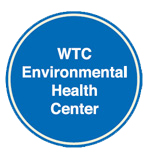HHC WTC Environmental Health Center Has Treated Almost 6,000 Lower Manhattan Residents, Workers, and Students Suffering From Health Effects of 9/11
Sep 08, 2011

On the 10th anniversary of the attacks of September 11, the New York City Health and Hospital Corporation’s (HHC) World Trade Center Environmental Health Center has treated almost 6,000 people who lived, worked or went to school in Lower Manhattan and have suffered the medical and mental health effects of 9/11. Statistics from the WTC health center show a patient population that is young – the average age is 47 – and has more than doubled in the last three years alone, from 2,759 in 2008 to 5,800 patients today.
“Although this event occurred 10 years ago, it’s had a lasting health impact on tens of thousands of New Yorkers,” said HHC President Alan D. Aviles. “The federal Zadroga law provides funding that allows us to offer continued treatment to those affected and who need care.”
Other notable patient demographic data include:
- 50% of patients were local workers at the time of the attacks.
- More than 20 % were local residents.
- 10 % were both residents and local workers.
- Almost 10 % were cleanup workers who went into the area after the attacks to clean offices and buildings and remove debris.
- 4 % were passersby or commuters who happened to be in the area.
- 3 % were students.
- 76% of patients suffer from lower respiratory disorders including cough, wheezing, shortness of breath and tightness in the chest.
- 47 % suffer from upper respiratory disorders including sinus and nasal congestion.
- 44 % suffer from digestive disorders including gastroesophogeal reflux disease (GERD).
- 51 % suffer from post traumatic stress disorder (PTSD), anxiety and depression.
“Lower Manhattan is a very diverse area in terms of culture, language, and ethnicity,” said Terry Miles, Executive Director of the WTC health center. “And 10 years later, everyone who lived there or worked there on 9/11 still deserves care.”
Of those WTC health center patients who provided their race, 27 percent are white, 20 percent are Asian and 13 percent are black. More than one-third are Hispanic. Unlike other WTC health programs, which are geared to first responders and are overwhelmingly male, the HHC WTC patients are evenly divided between male and female.
“Some patients do get better, but others have chronic conditions,” said Dr. Joan Reibman, Medical Director of the WTC health center. “For those with chronic disease, we help them keep their symptoms at bay so they can get on with their lives.”
Under the James Zadroga 9/11 Health and Compensation Act, which went into effect July 1, the WTC center, founded in 2005, is moving from a grant-based program paid for with city and federal money, to one with more long-term funding and federal dollars available through a combination of contracts and a fee-for-service system for the next five years, with a possible sixth year if money remains. HHC is expected to receive approximately $10 million annually. Patients can get treatment regardless of their insurance status or ability to pay. The law also provides the opportunity to do research and the WTC center has gotten approval to do a study on lung function changes in the WTC patient population over time.
The WTC Environmental Health Center works closely with a special Community Advisory Committee (CAC) to ensure its responsiveness to the needs of the people affected by the health impact of 9/11. Committee members include representatives of community-based organizations, advocacy organizations and labor groups that serve this population, as well as individuals and WTC EHC patients.
Anyone who believes they or a family member might have a health problem related to 9/11 may call toll free at 1-877-WTC-0107 (1-877-982-0107). When you call, you will reach a person who will ask a few questions about your health problems to see if the program is right for you. Information is also available on the HHC website, www.nychhc.org/hhc or by calling 311.
About HHC
The New York City Health and Hospitals Corporation (HHC) is a $6.7 billion integrated healthcare delivery system with its own 420,000 member health plan, MetroPlusHealth, and is the largest municipal healthcare organization in the country. HHC serves 1.4 million New Yorkers every year and more than 475,000 are uninsured. HHC provides medical, mental health and substance abuse services through its 11 acute care hospitals, five skilled nursing facilities, six large diagnostic and treatment centers and more than 70 community based clinics. HHC Health and Home Care also provides in-home services for New Yorkers. HHC was the 2008 recipient of the National Quality Forum and The Joint Commission’s John M. Eisenberg Award for Innovation in Patient Safety and Quality. For more information, visit www.nychhc.org/hhc or find us on facebook.com/NYCHealthSystem or twitter.com/NYCHealthSystem.